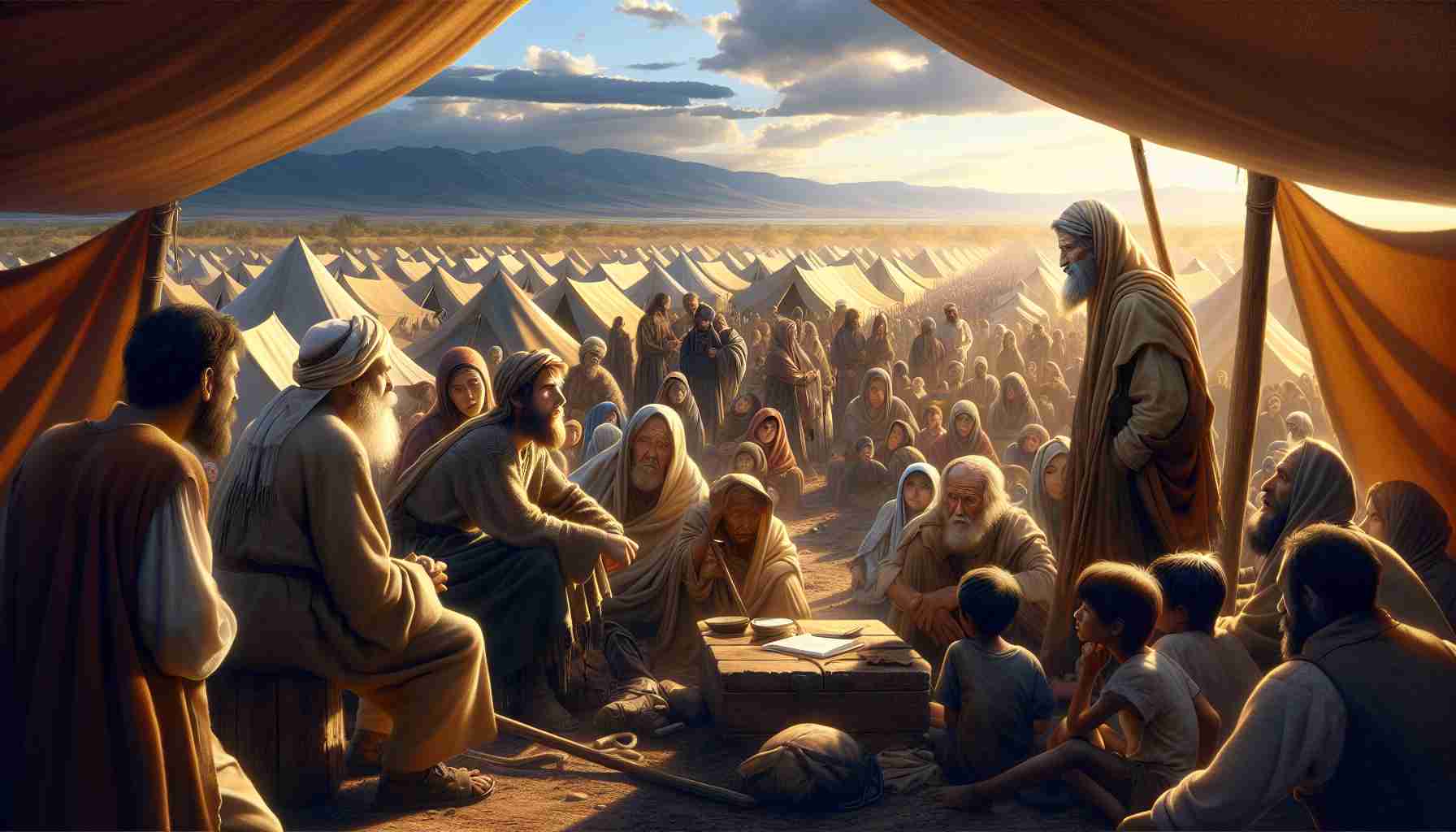

I was a scribe — not a famous one, just one of many who copied words day after day. My tent always had scrolls drying in the corners, ink on my hands, and prayers whispered under my breath. But it was not paper or prayer that changed me — it was the voice of an outsider, and the wisdom he brought.
It was the day Jethro arrived — Moses’ father-in-law. Jethro was a Midianite priest, not one of our people, but a wise and God-fearing man. That morning, as I carried fresh parchment to where Moses sat, ready to record the day’s rulings, I saw it in his face. His shoulders stooped. His eyes, though filled with faith, showed exhaustion.
From dawn until darkness, Moses sat in judgment. People stood in lines that stretched like rivers across the sand, waiting to ask him about disputes, questions of purity, debts, wrongs, and commands. I had been copying these cases for weeks. And as much as I respected our prophet, I feared the weight would crush him.
That evening, I stayed later than usual, waiting for the ink to set. I heard Jethro speak to Moses beneath a fig tree. “What you are doing is not good,” Jethro said. I turned my ear toward them. “You will surely wear yourself out, and the people with you. The task is too heavy. You cannot do it alone.”
My heart pounded. No one spoke like that to Moses. But Jethro continued with a calmness that bore no judgment. “Teach them G-d’s laws, yes. But appoint capable men — those who fear G-d, are trustworthy, and hate bribery — to be judges. Let them handle the small matters, bring only the great ones to you.”
I saw Moses nod slowly. He did not argue. He listened. That moment struck me harder than any passage I’d written.
What kind of leader lays down part of the burden? What kind of greatness listens to advice not from a fellow prophet, but from one of another nation? That night changed how I understood leadership — and faith.
Within days, dozens of men were chosen — judges over thousands, hundreds, fifties, and tens. And I, the unnoticed scribe, was asked to help train them, copying out the laws for each one. I watched farmers, shepherds, and former slaves become voices of justice, held to the same truths. And Moses — he smiled more. He prayed with more strength. He taught with deeper peace.
I realized then that wisdom isn’t just in knowing G-d’s word. It’s in the humility to share responsibility, the clarity to listen, and the faith to act not alone, but together.
I still carry ink on my hands, but I now write with a steadier heart. Jethro’s advice did more than ease Moses’ burden. It shaped a people — turning a wandering nation into a just one. And I was there to see it begin.
I was a scribe — not a famous one, just one of many who copied words day after day. My tent always had scrolls drying in the corners, ink on my hands, and prayers whispered under my breath. But it was not paper or prayer that changed me — it was the voice of an outsider, and the wisdom he brought.
It was the day Jethro arrived — Moses’ father-in-law. Jethro was a Midianite priest, not one of our people, but a wise and God-fearing man. That morning, as I carried fresh parchment to where Moses sat, ready to record the day’s rulings, I saw it in his face. His shoulders stooped. His eyes, though filled with faith, showed exhaustion.
From dawn until darkness, Moses sat in judgment. People stood in lines that stretched like rivers across the sand, waiting to ask him about disputes, questions of purity, debts, wrongs, and commands. I had been copying these cases for weeks. And as much as I respected our prophet, I feared the weight would crush him.
That evening, I stayed later than usual, waiting for the ink to set. I heard Jethro speak to Moses beneath a fig tree. “What you are doing is not good,” Jethro said. I turned my ear toward them. “You will surely wear yourself out, and the people with you. The task is too heavy. You cannot do it alone.”
My heart pounded. No one spoke like that to Moses. But Jethro continued with a calmness that bore no judgment. “Teach them G-d’s laws, yes. But appoint capable men — those who fear G-d, are trustworthy, and hate bribery — to be judges. Let them handle the small matters, bring only the great ones to you.”
I saw Moses nod slowly. He did not argue. He listened. That moment struck me harder than any passage I’d written.
What kind of leader lays down part of the burden? What kind of greatness listens to advice not from a fellow prophet, but from one of another nation? That night changed how I understood leadership — and faith.
Within days, dozens of men were chosen — judges over thousands, hundreds, fifties, and tens. And I, the unnoticed scribe, was asked to help train them, copying out the laws for each one. I watched farmers, shepherds, and former slaves become voices of justice, held to the same truths. And Moses — he smiled more. He prayed with more strength. He taught with deeper peace.
I realized then that wisdom isn’t just in knowing G-d’s word. It’s in the humility to share responsibility, the clarity to listen, and the faith to act not alone, but together.
I still carry ink on my hands, but I now write with a steadier heart. Jethro’s advice did more than ease Moses’ burden. It shaped a people — turning a wandering nation into a just one. And I was there to see it begin.